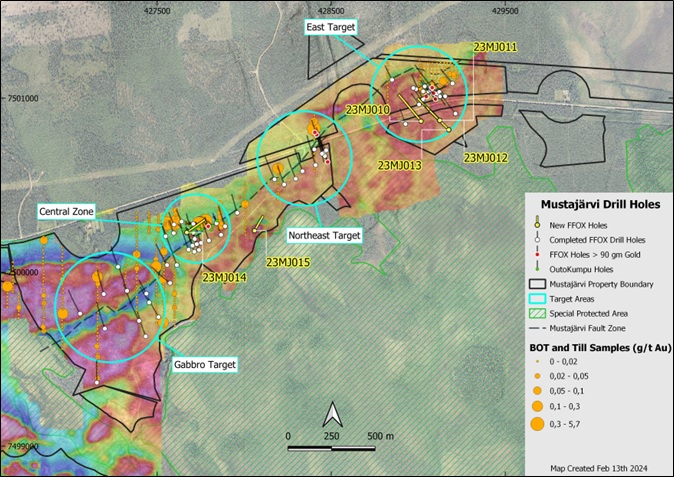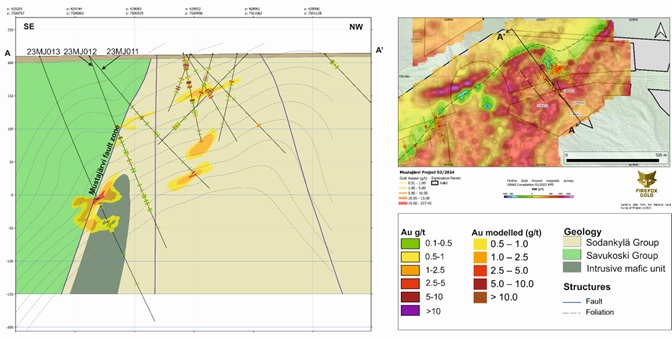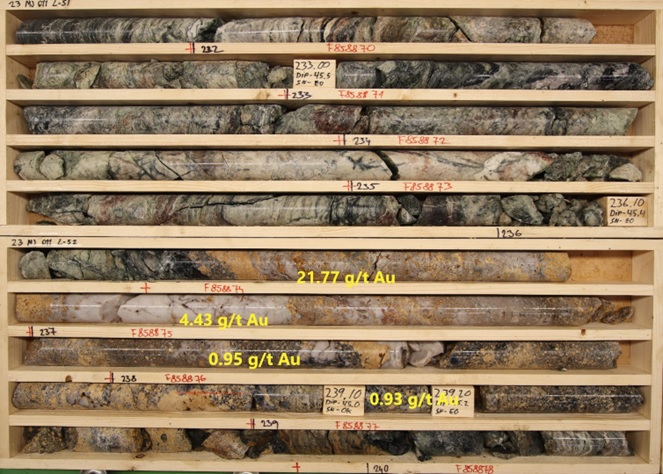FireFox Gold Reports Depth Extensions to the East Target at the Mustajärvi Project, Finland, including 3.16 g/t Gold over 13.5 metres
- None.
- None.
SODANKYLÄ, FINLAND / ACCESSWIRE / February 28, 2024 / FireFox Gold Corp. (TSXV:FFOX)(OTCQB:FFOXF)("FireFox" or the "Company") is pleased to report results from an additional six holes totalling 1,617.5 metres of drilling at the Company's
Results confirm that gold mineralization extends deeper to the south, where the system plunges to the southwest and is very likely down dropped by faults south of the surface expression. These holes are the deepest expression of the East Target yet, with strong gold intercepts occurring at more than 250 metres below surface. Even though these holes were significant step outs to the south and southwest, the results demonstrate opportunity for expansion to depth and to the southwest.
Selected Highlights from the latest drilling at the East Target
- Drill hole 23MJ013 intercepted:
- 13.5m averaging 3.16 g/t Au, from 230.6m depth, including
- 1.0m at 18.42 g/t Au; and
- 1.0m at 5.31 g/t Au, from 271m depth; and
- 6.5m at 1.01 g/t Au, from 281.5m depth.
- 13.5m averaging 3.16 g/t Au, from 230.6m depth, including
- Drill hole 23MJ011 intercepted:
- 3.6m averaging 5.96 g/t Au, from 236.3m depth, including
- 0.7m at 21.77 g/t Au; and
- 0.8m at 5.93 g/t Au, from 122.85m depth.
- 3.6m averaging 5.96 g/t Au, from 236.3m depth, including
Five of the six drill holes encountered significant gold mineralization, as defined by intercepts above 0.5 g/t Au (see Table 1). The final two holes of the program (23MJ014 and 23MJ015) were collared in, or near, the Central Zone to test a new drilling orientation and a geophysical anomaly.
Carl Lofberg, FireFox's CEO, commented about the new results, "Our newest drilling has extended the East Target mineralization 100 metres to the southwest and to more than 250 metres vertical depth. In doing so, we have confirmed a southwesterly plunge to the gold zone and picked up deeper gold intercepts across a major fault. These holes have defined a southern band of gold mineralization that needs much more drilling. Our latest results confirm that the gold remains open to southwest and downdip. Our next round of drill targets is already emerging from these new data. We look forward to having the drill back on site in the spring."
Mustajärvi Project and Drill Program Summary
The Mustajärvi Project lies along the highway between the cities of Kittilä and Sodankylä, approximately 17 kilometres east of Kittilä. The project remains at an early stage as FireFox and predecessor companies have drilled approximately 15,752 metres to date, and drilling has delineated three different lodes of gold mineralization along more than 1.5 kilometres of strike so far. Due to its near-surface high-grade nature, the Company has been focusing most recently on the East Target. In addition to testing for extensions at depth, the most recent holes in the East Target attempted to intersect the modelled contact between the Savukoski Group ultramafic volcanic rocks and Sodankylä Group metasediments. As shown in cross section below (Figure 3), FireFox's understanding of this important contact and nearby structures has improved considerably.
To date, most of the mineralization identified at Mustajärvi is hosted in metasedimentary rocks that have been intensely altered with albite, sericite, local silicification, sulfidation, iron carbonates, and/or cut by quartz-carbonate veining. High grades of gold are associated with quartz-carbonate-tourmaline-pyrite (QCTP) veins, hydrothermal breccias, or semi-massive to massive pyrite controlled by foliations. Gold is often enriched at or near the contact with mafic or ultramafic rocks. Until now, mafic rocks, either representing intrusive dikes and sills or thin layers within the Savukoski volcanics, have not typically been recognized as hosting significant gold grades. These new holes have encountered significant mineralization in numerous places within the mafic rocks, albeit so far at relatively low grades, such as 6.5m at 1.01 g/t Au in drill hole 23MJ013. The mineralized mafic rocks are usually intensely albitized with disseminated pyrite and cut by quartz-carbonate or QCTP veins.
Table 1. Significant Drill Intercepts in Drillholes 23MJ010 - 23MJ014
(Cut-off Grade 0.5 g/t Au)
Drill Hole | From (m) | To (m) | Interval (m) | Au Grade (g/t) | |
23MJ010 | 128.00 | 128.85 | 0.85 | 2.46 | |
198.50 | 199.40 | 0.90 | 2.29 | ||
23MJ011 | 122.85 | 123.65 | 0.80 | 5.93 | |
236.30 | 239.90 | 3.60 | 5.96 | ||
Including | 236.30 | 237.00 | 0.70 | 21.77 | |
23MJ012 | 132.00 | 133.00 | 1.00 | 7.60 | |
159.00 | 160.00 | 1.00 | 0.95 | ||
173.50 | 175.00 | 1.50 | 1.31 | ||
228.60 | 229.40 | 0.8 | 1.09 | ||
23MJ013 | 230.60 | 244.10 | 13.50 | 3.16 | |
Including | 231.60 | 234.30 | 2.70 | 11.07 | |
281.50 | 288.00 | 6.50 | 1.01 | ||
271.00 | 272.00 | 1.00 | 5.31 | ||
275.00 | 276.00 | 1 | 2.19 | ||
23MJ014 | 40.50 | 43.00 | 2.50 | 0.86 | |
55.15 | 56.15 | 1.00 | 1.56 |
The detailed drill pattern along with newly modeled gold shapes at the East Target are shown in Figure 2. Drill hole 23MJ010 was another step out hole southwest from the main high-grade zone, collared between the previously drilled westernmost holes (23MJ005 and 23MJ008). Drill holes 23MJ011 and 23MJ012 were drilled 100 metres east from the same collar in a fan configuration, where both holes plunge to the northwest but at angles of 50° and 70° degrees, respectively. The fourth drill hole, 23MJ013, was collared approximately

Figure 1. Mustajärvi Project showing drilling over ground magnetics and most recent holes labeled.
75 metres southeast of 23MJ011 and 23MJ012, making it the southernmost drill hole so far drilled in the East Target (approximately 100 metres farther southwest from previous drilling). FireFox geologists designed these holes to test the southwest and downdip continuation of the near-surface high-grade mineralization and to determine whether the interpreted sub-vertical faults on the south side of the zone are offsetting mineralization.
Detailed Description of Drill Holes
Hole 23MJ010 passed through variably altered (albite, quartz, and sericite) metasediments cut by repeating and alternating mafic dykes or sills, with several intervals of weak and moderate disseminated pyrite. These pyrite mineralized intervals were usually associated with strong sericitization and QCTP or quartz-pyrite veins, but also with fault breccia zones and metasediment-mafic sill contacts. The hole returned two gold mineralized samples above the cutoff grade of 0.5 g/t Au, 0.85m at 2.46 g/t from 128.0m downhole and 0.9m at 2.29 g/t from 198.5m downhole. These zones were associated with mineralized contacts or veining.
Hole 23MJ011 was designed to undercut and confirm the mineralization recorded in hole 23MJ004, as well as to test for further extensions of mineralization to depth. The hole also tested magnetic anomalies near the interpreted contact between the Savukoski Group ultramafic volcanic rocks and the Sodankylä Group metasedimentary rocks. The important contact was confirmed at 94.8m with traces of disseminated pyrite

Figure 2. Plan view of Mustajärvi East drilling with modeled gold shapes projected to surface.
and weak gold enrichment directly beneath the contact. The intercepted contact supports the previously interpreted and modeled Savukoski Group-Sodankylä Group contact as dipping steeply to the southeast.
The first significant gold-mineralized interval in 23MJ011 returned 0.8m at 5.93 g/t Au from 122.85m depth, and it was hosted in a quartz vein with semi-massive clots of pyrite. A second significant mineralized interval at 236.3m depth returned 3.6m of 5.96 g/t Au, including 0.7m of 21.77 g/t Au. This mineralization was hosted in a fault breccia zone containing remnants of QCTP veins (Figure 4). This interval included grains of fine visible gold and fluorite, which is often associated with open space in higher grade zones at Mustajärvi. The gold mineralized fault breccia in this hole may relate to previous intercepts in drill holes 23MJ004 and 23MJ003 (see Company news release dated July 18, 2023), suggesting an encouraging new deeper target in this area of the property.

Figure 3. SW facing cross-section showing the drill hole fence 23MJ013-23MJ011 and the interpreted mineralization along the section plan A-A'.
Hole 23MJ012 was aimed more steeply from the same drill pad as 23MJ011 to test depth extents of the system and for evaluating the steeply dipping faults interpreted in the area. The hole pierced the Savukoski - Sodankylä contact as expected, at 125.6 metres depth. The contact was marked by a heavily sheared mafic sill, and intensely altered and faulted metasediments just below that with abundant pyrite and 1.0m of 7.6 g/t Au.
Once passing through the key contact, this hole can be characterized as containing numerous intervals of low-level gold mineralization but lacking the thicker or higher-grade zones seen above it (See Figure 3). In total, there are 37 sample intervals with gold grades greater than 0.1 g/t, but most do not exceed the cutoff for significance (0.5 g/t). There are intervals of albitized and pyritic metasediments with scattered quartz-carbonate, tourmaline, and QCTP veins. These intervals of low-grade gold may represent splays or structural offsets to the stronger gold zones observed at higher levels.
Drill hole 23MJ013 was collared farther south so that it could be aimed deeper towards a deeper part of the mineralized contact zone that was delineated earlier in 2022 and 2023. The contact was intersected at 230.6 metres, below which the metasedimentary rocks were highly albitized, sulphidized, and variably silicified over approximately 13.0 metres. That interval included abundant pyrite in both replacement and vein styles, as well as quartz, sulphide, and tourmaline veins and hydrothermal breccias. This interval carried strong gold mineralization over 13.5m averaging 3.16 g/t between 230.6 and 244.1m downhole, including 2.7m of 11.07 g/t. The higher-grade intervals are usually associated with narrow semi-massive to massive pyrite. While most of the gold at this mineralized contact is hosted in metasediments, there are also thin mafic dikes or sills that are mineralized with gold and pyrite. This zone also includes anomalous bismuth, molybdenum, and tellurium, although copper, lead, and zinc are at background concentrations.

Figure 4. Fault breccia zone in 23MJ011 with 3.6m of 5.96 g/t Au from 236.3m downhole. Visible gold flakes were observed from two intervals grading 21.77 g/t Au and 4.43 g/t Au.
The deeper sections of hole 23MJ013 contained thicker mafic sills, often veined (quartz carbonate and QCTP veins) and flooded with albite and/or silica. These veins and alteration haloes within the mafic sills locally contain disseminated pyrite and gold. The presence of significant pyrite and anomalous gold in the mafic intrusive rocks at Mustajärvi is uncommon, but several intervals in this hole contained significant gold: 1.0m at 5.31 g/t from 271m depth, 1.0m at 2.19 g/t from 275.0m, and 6.5m that averaged 1.01 g/t from 281.5m. The wider interval was hosted in a strongly albite-altered mafic sill crosscut by quartz-carbonate-tourmaline veins surrounded by disseminated pyrite.
Most of the gold mineralization at Mustajärvi is associated with abundant pyrite and anomalous bismuth, molybdenum, selenium, and tellurium, whereas silver, arsenic, antimony, copper, and other base metals are at (or near) background levels. In contract, it may be noteworthy that this deeper gold mineralization in the mafic (gabbroic) sills and dikes has a relatively low abundance of pyrite, and only shows slightly anomalous bismuth, molybdenum, selenium, and tellurium.
After completing drill hole 23MJ013 the drill rig moved to the Central Zone (approximately 1.5 kilometres to the west), where drill hole 23MJ014 was collared approximately 100 meters north from previous drill hole 22MJ016. This hole was aimed in a different direction (NE) to test for the presence of crosscutting structures, perpendicular to the northeast-striking Mustajärvi Shear Zone (MSZ). All previous drill holes at this target were drilled perpendicular to the MSZ, but NE-directed holes at the East Target encountered important crosscutting mineralization. Drill hole 23MJ014 intercepted primarily moderately albitized intermediate tuffites and mafic tuffs with evidence of faulting.
Intervals of more intense alteration and brecciation that are cut by quartz-pyrite and QCTP veins are locally mineralized with gold over narrow widths. One of these zones at 40.5-43.0m depth returned 2.5m averaging 0.86 g/t Au. A number of other fault zones with veining contained 0.5 to 1.56 g/t gold over narrow widths.
The final drill hole, 23MJ015, was collared almost 400 metres east from hole 23MJ014, targeting an unusual magnetic low detected in the ground magnetics surveys. The hole was drilled entirely within the Savukoski Group ultramafic rocks with a few thin fault zones and no significant gold assays.
Table 2. Drill Collar Information (coordinates presented in EPSG:3067)
Drill Hole | Easting | Northing | Azimuth (°) | Plunge (°) | Final Depth (m) | Target Area |
23MJ010 | 429016.0 | 7500868.0 | 320 | 45 | 277.9 | East Target Deep |
23MJ011 | 429123.4 | 7500873.0 | 315 | 50 | 274.9 | East Target Deep |
23MJ012 | 429123.4 | 7500873.0 | 315 | 70 | 314.8 | East Target Deep |
23MJ013 | 429175.3 | 7500818.7 | 315 | 70 | 441 | East Target Deep |
23MJ014 | 427669.8 | 7500228.6 | 55 | 45 | 175 | Central Zone |
23MJ015 | 428059.5 | 7500238.6 | 30 | 45 | 133.9 | Near Central Zone area |
Methodology & Quality Assurance
The core was transported from the rig to the Company´s core storage facility in Sodankylä, where FireFox's exploration team conducted the geological and geotechnical logging and selected the assay intervals. Assay intervals were generally 1 metre but in some circumstances were modified according to lithological boundaries and other factors. FireFox geologists maintained chain of custody and sampling procedures according to best industry practice and with due attention to quality assurance and quality control, including sampling field duplicates and insertion of certified standard and blank samples.
FireFox team members transported the samples to an ALS sample prep lab in Sodankylä. The samples were sawed then crushed to -2 mm, split and pulverized into 1kg pulps, before being shipped to the ALS facility in Rosia Montana, Romania for gold by fire assay of 50 gm aliquots with AAS finish (method Au-AA24). All samples exceeding 10.0 g/t Au were re-assayed in triplicate by fire assay of 50 gm aliquots with a gravimetric finish (method Au-GRA22). Other elements, altogether 48, were measured after four-acid digestion by ICP-AES and ICP-MS (method ME-MS61) at the ALS facility located in Loughrea, Ireland.
ALS Laboratories is a leading international provider of assay and analytical data to the mining industry. All ALS geochemical hub laboratories, including the Irish facility, are accredited to ISO/IEC 17025:2017 for specific analytical procedures. The Firefox QA/QC program consists of insertion of certificated standard material and blanks inserted by Firefox into the analytical batches did not show deviations from recommended values.
Patrick Highsmith, Certified Professional Geologist (AIPG CPG # 11702) and director of the Company, is a qualified person as defined by National Instrument 43-101. Mr. Highsmith has helped prepare, reviewed, and approved the technical information in this news release.
About FireFox Gold Corp.
FireFox Gold Corp is listed on the TSX Venture Stock Exchange under the ticker symbol FFOX. FireFox also trades on the OTCQB Venture Market Exchange in the US under the ticker symbol FFOXF. The Company has been exploring for gold in Finland since 2017 where it holds a large portfolio of prospective ground.
Finland is one of the top mining investment jurisdictions in the world as indicated by its multiple top-10 rankings in recent Fraser Institute Surveys of Mining Companies. Having a strong mining law and long mining tradition, Finland remains underexplored for gold. Recent exploration results in the country have highlighted its prospectivity, and FireFox is proud to have a Finland based CEO and technical team.
For more information, please refer to the Company's website and profile on the SEDAR website at www.sedar.com.
On behalf of the Board of Directors,
"Carl Löfberg"
Chief Executive Officer
CONTACT:
FireFox Gold Corp.
Email: info@firefoxgold.com
Telephone: +1-778-938-1994
Forward-Looking Statements
The information herein contains forward-looking statements that are subject to a number of known and unknown risks, uncertainties and other factors that may cause actual results to differ materially from those anticipated in our forward-looking statements. Factors that could cause such differences include changes in world commodity markets, equity markets, the extent of work stoppage and economic impacts that may result from illness, extreme weather, changes in government and changes to regulations affecting the mining industry.
Forward-looking statements in this release may include statements regarding: the intent to conduct additional drilling; the belief as to the location of the most prospective gold targets; the location of targets for future drill programs; and the current and future work program, including the extent and nature of exploration to be conducted in 2024. Although we believe the expectations reflected in our forward-looking statements are reasonable, results may vary.
The forward-looking statements contained herein represent the expectations of FireFox as of the date of dissemination and, accordingly, are subject to change after such date. Readers should not place undue importance on forward-looking statements and should not rely upon this information as of any other date. FireFox does not undertake to update this information at any particular time except as required in accordance with applicable laws.
SOURCE: FireFox Gold Corp
View the original press release on accesswire.com







